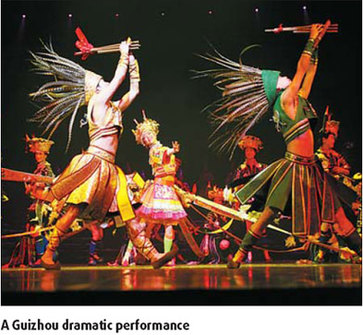
|
REGIONAL> Culture Tourism
 |
|
Show presents essence of Guizhou ethnic cultures
By Zhao Shijun (China Daily)
Updated: 2008-09-26 07:58
 Home to 17 ethnic groups, Guizhou province in southwest China is renowned for its colorful cultures and one of the best ways to experience them is to join in their wide range of festivals. Tourists can experience one festival virtually every single day of the year if they have enough time and energy to tour the province daily, because there are more than 1,000 festivals in Guizhou every year. But now just sitting for a couple of hours in a theater in Guiyang, capital of the province, or other places across the country, offers the chance to see the essence of these ethnic cultures, thanks to a large show created by the province's performing artists. Called "Colorful Guizhou", the show gives a brief introduction to the lives and folklore of its ethnic people. Organizers expect audiences will have a good impression and be attracted to visit the area. With singing and dancing performances by seven ethnic groups, including the Miao, Dong, Yao and Tujia, the show presents their original customs. The drama's story is narrated by a Guizhou girl. On a trip returning to her hometown, she travels to many places in Guizhou and joins in a number of festivals, which offer the dramatic opportunity for each group to perform and entertain the audience. In a Miao village, the girl watches a dance called "Hunters of Basha" performed by a group of females. With a scroll representing dense forest as the backdrop, performers dance with rifles in their hands. Their dance features strong movements and tender facial expressions. The Basha are part of the Miao ethnic group. Famous for their hunting skills, they are called "the last tribe of riflemen in China". In a Tujia village, the heroine of the show watches a dance called "Waving and Waving", that tells how the hand waving dance of the Tujia people evolved from ancient rituals to today's carnival. Then in a Buyi village, the girl's yearning for home is evoked after seeing "the Mother's Song" performed by the Buyi people. By a small brook, a Buyi mother, while operating her spinning wheel, sings tender songs to express her thoughts of her daughter living far away. The show was begun in 2005 and since then more than 500 performances have been staged before a total audience of 500,000 worldwide. In addition to regular performances in Guiyang, the show has been staged in more than 20 cities, including Beijing, Shanghai, Hangzhou, London and Paris. Audiences have given an enthusiastic response. "After watching the show, my first thought is that I'd like to go to Guizhou immediately," said a Russian diplomat in Beijing.
|